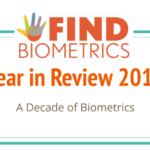
Biometric software specialist Precise Biometrics recently announced a major company milestone: its YOUNiQ access control solution was deployed at Clarkson University, marking the company’s entry into the US market. The state-side installation is emblematic of Precise’s evolution in recent years, from a fingerprint algorithm provider for mobile and embedded fingerprint technologies, to a larger-scale multi-modal biometrics specialist serving not just the the smartphone market, but now active in the worlds of IoT and access control.
In a recent interview with FindBiometrics founder Peter O’Neill, Precise Biometrics CEO Stephan K Persson elaborates on the Clarkson University deployment, before offering insights on the role of multimodality and liveness detection in the biometrics space, as well as the role of cryptographic hashing technologies. Persson goes on to shed light on the biometric smart cards market, and the need for contactless payments in a post-pandemic world, before giving readers a preview of what’s next for Precise.
Read the full FindBiometrics interview with Stefan K Persson, CEO, Precise Biometrics:
Peter O’Neill, Founder, FindBiometrics: Let’s start off with the most recent news you have just announced. Can you please give us an update on your most recent installation in the US please?
Stefan K Persson, CEO, Precise Biometrics: Yes, of course. We announced this morning [January 29, 2021] that we today have had a first customer installation in US. This is a major milestone for Precise and the installation of the YOUNiQ system. It’s a commercial agreement with Clarkson University and its part of what they call the Clarkson Center for Innovation, where they have 12 companies and approximately 150 employees, which will utilize the system to get access into the facilities.
It’s a fantastic achievement. I mean, we started with this product less than two years ago with the development and we introduced it to the market in northern countries during last year with proof of concept and pilots, and last year we signed approximately 20 contracts. We have more than 50 installations now in Sweden and today, we passed the huge milestone with the US. It is handled by our US team headed up by Mark Cornett. Now we will start to move into the US market. Of course, we will start with New York state to roll it out. So, it’s a fantastic step towards international global phase of the product.
Peter O’Neill: Well, that’s very exciting news. The marketplace certainly is changing quite dramatically right now. With biometric technology now being a standard feature on smartphones and other mobile devices, what do you think that means for the future of mobile identity?
Stefan K Persson: So, this is one of the key areas we identified when we were looking into the strategy and growth of the company for the future. We started with the fingerprint algorithm and that, we’re still working with. The change now is that we think that the fingerprint algorithm will be a key driver for your private equipment like mobile phones and computers, etc. When you’re out in the public, there will be a greater need for biometrics like the face, because you don’t want to touch public things and this is the consequences of the global pandemic and the COVID situation. So we think that it will be a combination of both a fingerprint and face and other biometrics that will be used in different applications.
The good thing with this is that YOU are the key. You are always the key and you bring with you this key, no matter who you are, where you are and what you do, and you can control it yourself. It gets approval once you use it and you can remove it as soon as you don’t want to use it anymore, which means that you will get rid of all codes, passwords, physical tags, and cards. So, it will be, I will not say a revolution because it will be an evolution step by step, but for sure, but we see a trend now that is very clear.
The good part also with biometrics is that you can of course, step it up. You can utilise multimodality as we say. So, if you have a not so high security area, you only use one modality, but if you want to increase the security, you use several of the modalities. For instance, we are selling to a nuclear plant and they use both a pin code, they use a card, and they use fingerprint in combination.
We have other companies that want to use fingerprint and face, and then we have some companies that just want to use the face. So, it’s a combination that the customer can freely choose which level of security they want.
We strongly believe that there will not be one technology that will win, of course there will be at least mobile apps and Bluetooth and all that also. But the good thing when you use your biometrics is of course that you can be sure who the user is and who is using it. In the case of cards and actually sometimes on mobile phones, you’re not sure who actually is holding the mobile phone or holding the card. But if you use biometrics then for sure you know who is the user who wants to get access to an application on the computer or in a facility.
Peter O’Neill: With the integration of facial recognition into your YOUNiQ access control solution, Precise has proven itself as a truly multimodal biometric company. How can we expect your success with multimodality to influence your activity in the mobile space?
Stefan K Persson: I think, as I said earlier, that there will be different applications that need different types of biometrics. And what we have said is that Precise is extremely strong in understanding biometrics, and now during the last three years, we have built on top of that a very strong system integrator team and system architect team, which means that we are a strong believer in an open environment to build and create an ecosystem. Like the mobile phone, for instance, if you remember, many years ago you had the Motorola, you had Nokia, you had the Ericsson that built their own system. And it was absolutely not open, but then when the Apple phone was launched and at that time also, we have Android and the Google Android system, you created an openness, which means that you get a much, much broader possibility to add new features and add the different features on top of the existing systems.
It created an open ecosystem and we will see that also in many different other applications for instance, like physical access, which today is a traditional old fashioned way of handling access and the company building their own system in the closed environment. But it will go so fast and open up, which means that you can utilize different types of applications from both mobile phones, from tags and cards and all that in combination with biometrics, hopefully we’ll see a revolution in that area going forward.
Peter O’Neill: I’d like to revisit your comments about fingerprint. Fingerprint based authentication is showing some real staying power on mobile devices, even as selfie-based authentication has become sort of more mainstream. What are some of the most important innovations in fingerprint biometrics in the mobile space today?
Stefan K Persson: We’ll see, for instance, larger screens, larger fingerprint sensors so you can have multi-tapping, so you can have multi-authentication, so you can use one, two, three, four fingers instead of just one. You can have continuous authentication, which means that if you press a certain area on the mobile phone, we directly get the verification that this is the right person. So that trend is very clear.
Of course, there is always price pressuring in that area. There is always the drive for getting down the prices, which we will see in this area also, of course. Then I think that there will be a combination; multimodality on mobile phones, where you will combine face with fingerprint. So, if you just want to open up your phone, you maybe use your face, but then when you’re going to do a payment or a larger transaction or something like that with your bank, you maybe need both your face and your fingerprint. So that is, I would say, a clear trend.
Another trend is of course what we call liveness, to make sure it’s not a spoof and it’s a real person. I can see that there is a huge interest from both the Apple environment and then the Google environment also to improve the security levels. And there we also have some good products internally about liveness and liveness detection on the mobile phone.
So, it’s a combination I can see of different types of biometrics and better liveness detection in combination of the price pressure that we’ll see down the road here.
Peter O’Neill: In light of your recent partnership with Infiniti Optics on biometric hashing technology, are you anticipating a rise in hack attacks targeting biometric data specifically? How important will hashing be in securing digital identity moving forward?
Stefan K Persson: So, hashing is one technology that might be the technology for the future, or maybe not. The system is in the research stage. We believe strongly that if this is to really take off, you need to be able to distribute your biometrics in one way or another way. So, you actually don’t need to do the enrollment at the same place that you actually want to use it. And that we have been able to solve in the face area, but we are of course very interested to do that solution also in the fingerprints, that you actually can do enrollment on one device, and then you can utilize your biometrics to open up another device in another area. So, I think we will see more and more research and development in this area to secure the data, secure the information about the people, because if your pin code or password is getting out there and someone steals it, then you just change it.
It’s extremely important that the quality, when it comes to the security around the biometrics, is top-notch. And of course, there will always be bad guys who try to hack this. We have seen that for instance, a company in Asia was attacked and a lot of information about biometric came out. So, we are spending a lot of resources and efforts into this area to make it as secure as possible. And then this is one of the signatures of Precise in the biometric era, Precise Biometrics is synonymous with high quality and high security. And that, we will continue to protect forever.
Peter O’Neill: There’s a lot of excitement about the emergence of biometric payment cards. We’ve been writing a lot about this, especially the last two years. How important will this be to your business over the next year?
Stefan K Persson: So, we are ready to go. We’ll have developed the first algorithm for the payment card. We’ll have done that in the very close collaboration with NXP which is one of our key customers here. We have also software that is agnostic, hardware agnostic, which means that independent of which sensor you’re using, you can utilize our software.
What we should remember in this area when it comes to payment card is that it’s a different story compared to the mobile phone. We have a lot of interest from banks, from financial institutions but it is a very tricky environment. And we have a situation that is really tough because the card needs to be viable for three years even with all the bending and environmental effects. And the enrollment on the card needs to be a very smart and easy to do.
We are following the industry, we’re supporting it, we have it ready to go, but the all of the MasterCard, Visa, and AmEx and all these guys need to approve it.
We will not be a company that needs to be successful in this area. It’s, a positive thing if it will happen, if it will not happen, then it will not have a big impact on the company because we are focused on the mobile phone, computer area and into YOUNiQ and digital identity. So, when it comes to the smart card, we are not betting everything on it. If it happens, it happens, but the company will not die if it does not happen.
Peter O’Neill: Some interesting thoughts there, thank you. COVID-19 has created some new opportunities, especially with companies that may have not been exposed to biometrics and higher end security such as the mid-market in the United States. Every company is now faced with trying to deal with physical access challenges and health checks. Do you see this as a growth area for your company?
Stefan K Persson: Oh, absolutely. This is a huge potential. There will be more and more security needed, there will be more and more touchless interfaces, and it will be more and more convenient. So, all these are perfect for our YOUNiQ and digital identity. We can see more and more payment, more and more applications, both from the mobile phone and computer that need higher security and you should not use codes and all that because you should use your biometric instead. So, the trend is very clear, it’s super, super clear. And that brings us to touchless payment. So even if the journey is tricky, when it comes to smart cards and payment cards, we have today, the possibility to have payment where your mobile phone is the touchless. So, absolutely a very good trend when it comes to biometrics in all applications and in new areas. And of course, COVID has helped us to get more attention in this area. I will say that this is the only good effect from COVID but there is really high attention being paid to contactless payment, contactless access, and digital handling. And that is a perfect match with Precise Biometrics’ profile.
Peter O’Neill: Well, thank you very much, Stefan. It’s been a pleasure to speak to you. Just before we end off, what can we expect to see from your company this year? You have mentioned a lot of things, but I think education in our market is critical. What can we expect to see from your company?
Stefan K Persson: We will continue with the same strategy; we have stabilized our mobile business and we are continuing to improve in the mobile business. Also, we have some new, interesting technology around the corner here, and we have big hopes for the mobile area. When it comes to the YOUNiQ access, it has huge potential. Just the market in Sweden alone is more than 100 million US dollars. And, that’s only in Sweden so, the international global aspect of this is huge, and we will continue to roll out the access part there and now that we’ve started in the US as well, we will take this step by step. So, we are building the foundation. The last two years have been a lot of cleaning, a lot of doing things in the right way, making sure that we support the customer in the right way and establish the new strategy. And this year now is all about acceleration.
Peter O’Neill: Stefan, lots of very exciting things going on with your company. Thank you very much for filling us in. And we look forward to hearing more good news throughout the coming year.
Stefan K Persson: Thank you Peter. As always, a pleasure to speak with you and FindBiometrics.


![INTERVIEW: Precise Biometrics’ Fredrik Sjoholm at Money20/20 Europe [AUDIO]](https://idtechwire.com/wp-content/uploads/HiRes6-150x150.jpg)





Follow Us